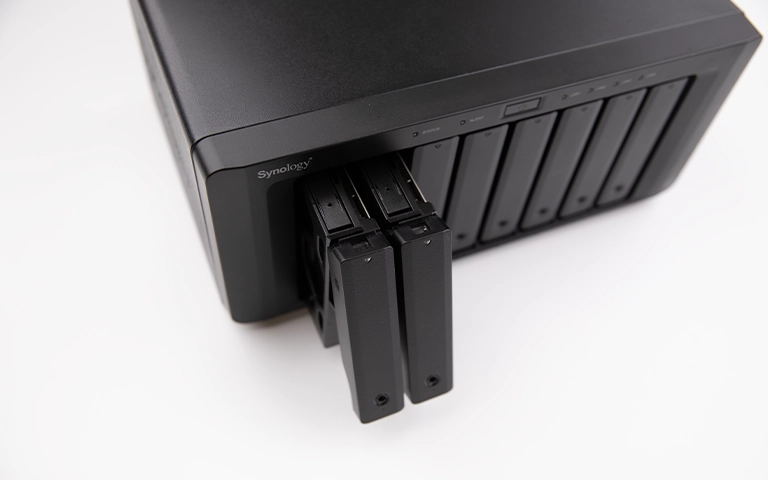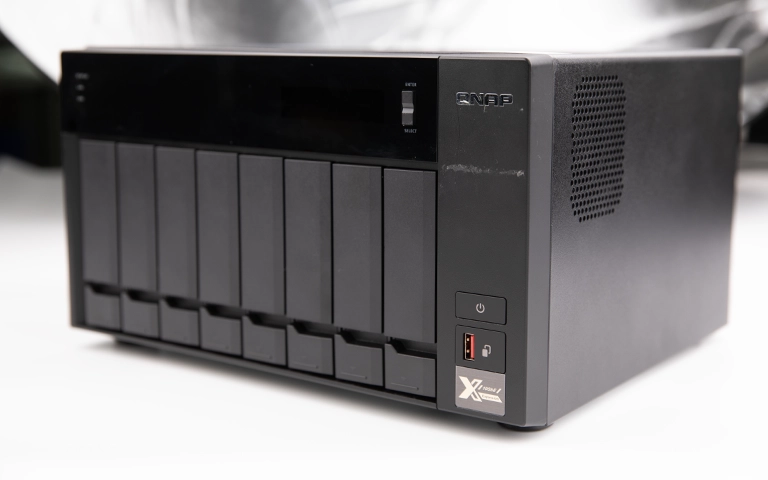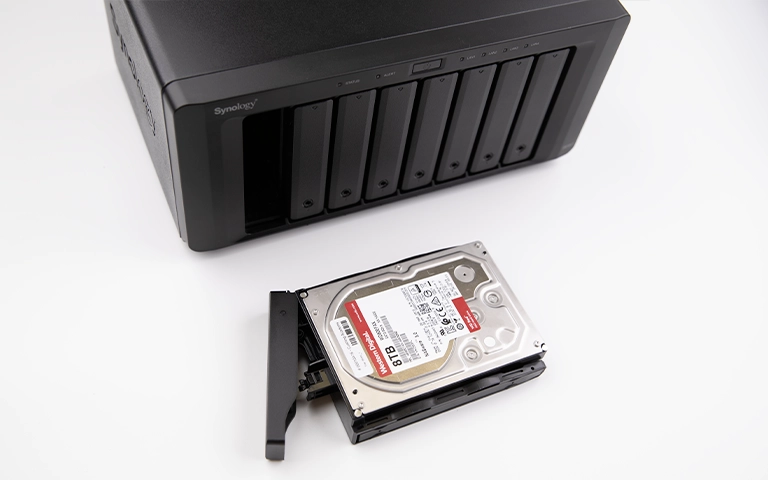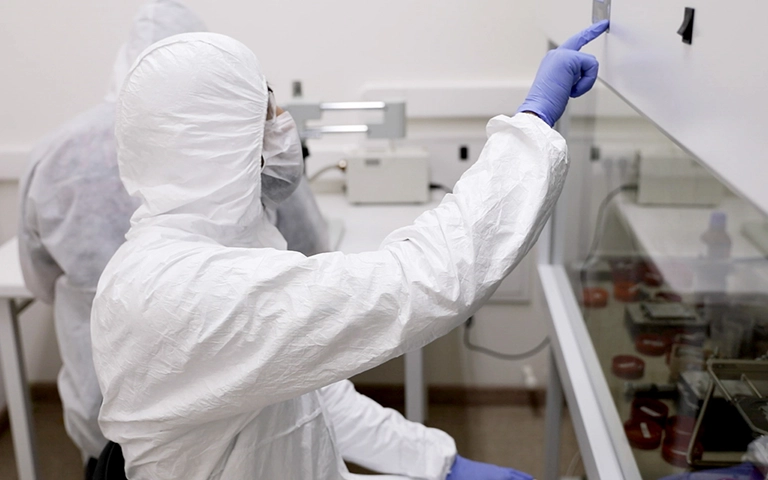In today’s data-driven world, every organisation depends on fast, secure access to information. From customer records to project files, a centralised storage platform is essential for collaboration and efficiency.
Network Attached Storage (NAS) offers a straightforward, scalable way to store, organise, and share data across your network. Whether you run a small team or a growing SME, NAS for business keeps files available and protected against unexpected failures.

What is NAS storage and how it works
NAS, or Network Attached Storage, is a dedicated file-storage device that connects to your local network. It lets multiple users and devices access and share data from a single, central location.
Unlike an external drive tethered to one computer, NAS operates like a private cloud within your office. Staff can store, edit, and back up files at the same time without needing the internet.
Most NAS appliances house multiple drives arranged in RAID. This boosts performance and safeguards data against individual drive failures, keeping business data available and resilient.
For configuration guidance, see our article on NAS RAID options to choose the best fit for your environment.
Top benefits of NAS for businesses
NAS offers clear advantages for organisations managing fast-growing data sets.
Centralised file storage: Keeps all business data in one secure location, reducing duplication and confusion.
Easy file sharing: Team members can access and edit files from any connected device on the same network.
Data protection with RAID: Most NAS for business setups use RAID to tolerate a single-drive failure without data loss.
Scalable capacity: As your needs grow, add bays, swap to higher-capacity disks, or upgrade the chassis to increase storage.
Remote access: Many appliances provide secure, cloud-style access so you can reach files from anywhere with the right permissions.
Cost-effective solution: Delivers enterprise-grade storage benefits without the overheads of a dedicated server.

NAS vs Traditional File Servers
Both NAS and traditional file servers store and share business data, but they differ on cost, management, and scalability.
NAS provides the flexibility and headroom many small and medium-sized businesses need. To choose the right fit, compare popular models in QNAP vs Synology and see how each brand meets business storage requirements.
How to choose the right NAS for your business
Selecting the right NAS depends on your organisation’s size, workflows, and data profile. Before you invest, assess the following:
Choose a NAS that meets today’s needs and can scale. Prioritise multi-bay models so you can add drives or swap in higher-capacity disks without downtime.
Match the RAID level to your balance of speed and resilience. RAID 5 or RAID 6 provides redundancy, while RAID 10 delivers higher performance. For a deeper dive, see NAS RAID Options to identify the setup that fits your data priorities.
Estimate concurrent users and file types. Teams handling large media, CAD, or database workloads should opt for faster CPUs, more RAM, and multi-gig or 10GbE networking.
Your NAS should support scheduled backups, versioning, and off-site replication. Even robust systems can fail. If that happens, review NAS Failure and Recovery to understand how professionals restore access to critical business data.
Look for encryption at rest, granular user and group permissions, secure remote access, and audit logging. Protecting sensitive business information must remain a top priority.

Common NAS issues and data loss risks
NAS platforms are reliable, but failures still happen. Understanding the risks helps you avoid permanent loss.
Drive failures: A single disk fault can degrade performance or trigger data loss. Review NAS Drive Failure Rates to understand the exposure.
RAID degradation: If a rebuild is interrupted or misconfigured, the array becomes vulnerable. Learn more in NAS Failure and Recovery.
Power events: Sudden outages or surges can corrupt files or damage the controller and PSU.
Human error: Accidental deletion or reformatting can render data inaccessible, though recovery is often feasible.
Firmware and OS issues: Failed updates or incorrect settings may cause boot loops or file-system corruption.
If your NAS becomes unresponsive, avoid DIY rebuilds or file-system repairs. Power it down and contact a specialist. At RAID Recovery Services, we recover data from failed NAS systems safely and efficiently. See how in our NAS Data Recovery Case.
Fast turnaround times for business-critical data
Protecting your business data with RAID Recovery Services
A NAS is an efficient way to store and share business data, yet even robust deployments can fail. Hardware faults, RAID corruption, or accidental deletion can trigger costly downtime if not handled correctly.
At RAID Recovery Services, we specialise in restoring data from all NAS brands and RAID configurations. Our engineers work in secure laboratory environments and use proven recovery workflows to retrieve data from damaged disks, failed arrays, and inaccessible systems.
If your NAS becomes unreadable or shows warning signs of failure, power it down and contact our team. We will diagnose the issue and recover your files quickly and safely so operations can continue with minimal disruption.

Conclusion
NAS for business provides a dependable, scalable, and secure platform for managing growing data needs. It strengthens collaboration, protects critical files, and ensures fast access for every team member.
No storage system is completely risk free. If data loss occurs, professional recovery is the safest route.
Contact RAID Recovery Services for an expert evaluation and secure NAS data recovery, delivered with minimal disruption to your operations.
Trust the experts with proven results
Frequently Asked Questions
What makes NAS storage ideal for businesses?
NAS provides centralised, secure file storage accessible from multiple devices. It improves collaboration, supports automated backups, and offers redundancy through RAID. For many teams, NAS for business delivers the right balance of simplicity and control.
How is NAS different from a regular file server?
NAS is simpler to deploy and maintain. It is purpose-built for file sharing and storage, whereas traditional servers need more IT effort and typically run multiple roles beyond storage.
Can NAS protect against drive failures?
Yes. Most NAS units use RAID to distribute data and parity across disks. If one drive fails, files remain accessible while you replace the disk and rebuild the array.
What should I do if my NAS becomes inaccessible?
Do not reboot repeatedly or attempt DIY repairs. Power it down and speak to a recovery specialist. Read our article on NAS Failure and Recovery to understand the next steps.
Does RAID Recovery Services recover data from any NAS brand?
Yes. We handle all major platforms, including Synology, QNAP, Buffalo, and others. Our engineers recover data from any configuration, even after complex RAID faults or hardware issues.